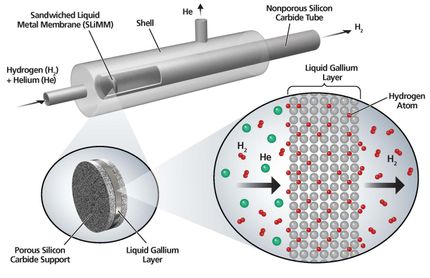Music is the engine of new U-M lab-on-a-chip device
Music, rather than electromechanical valves, can drive experimental samples through a lab-on-a-chip in a new system developed at the University of Michigan. This development could significantly simplify the process of conducting experiments in microfluidic devices.
A lab-on-a-chip, or microfluidic device, integrates multiple laboratory functions onto one chip just millimeters or centimeters in size. The devices allow researchers to experiment on tiny sample sizes, and also to simultaneously perform multiple experiments on the same material. There is hope that they could lead to instant home tests for illnesses, food contaminants and toxic gases, among other advances.
To do an experiment in a microfluidic device today, researchers often use dozens of air hoses, valves and electrical connections between the chip and a computer to move, mix and split pin-prick drops of fluid in the device's microscopic channels and divots.
"You quickly lose the advantage of a small microfluidic system," said Mark Burns, professor and chair of the Department of Chemical Engineering and a professor in the Department of Biomedical Engineering.
"You'd really like to see something the size of an iPhone that you could sneeze onto and it would tell you if you have the flu. What hasn't been developed for such a small system is the pneumatics---the mechanisms for moving chemicals and samples around on the device."
The U-M researchers use sound waves to drive a unique pneumatic system that does not require electromechanical valves. Instead, musical notes produce the air pressure to control droplets in the device. The U-M system requires only one "off-chip" connection.
"This system is a lot like fiberoptics, or cable television. Nobody's dragging 200 separate wires all over your house to power all those channels," Burns said. "There's one cable signal that gets decoded."
The system developed by Burns, chemical engineering doctoral student Sean Langelier, and their collaborators replaces these air hoses, valves and electrical connections with what are called resonance cavities. The resonance cavities are tubes of specific lengths that amplify particular musical notes.
These cavities are connected on one end to channels in the microfluidic device, and on the other end to a speaker, which is connected to a computer. The computer generates the notes, or chords. The resonance cavities amplify those notes and the sound waves push air through a hole in the resonance cavity to their assigned channel. The air then nudges the droplets in the microfluidic device along.
"Each resonance cavity on the device is designed to amplify a specific tone and turn it into a useful pressure," Langelier said. "If I play one note, one droplet moves. If I play a three-note chord, three move, and so on. And because the cavities don't communicate with each other, I can vary the strength of the individual notes within the chords to move a given drop faster or slower."
Burns describes the set-up as the reverse of a bell choir. Rather than ringing a bell to create sound waves in the air, which are heard as music, this system uses music to create sound waves in the device, which in turn, move the experimental droplets.
"I think this is a very clever system," Burns said. "It's a way to make the connections between the microfluidic world and the real world much simpler."
The new system is still external to the chip, but the researchers are working to make it smaller and incorporate it on a microfluidic device. That would be a step closer to a smartphone-sized home flu test.
Original publication: "Acoustically-driven programmable liquid motion using resonance cavities"; Proceedings of the National Academy of Sciences 2009
Topics
Organizations
Other news from the department science

Get the chemical industry in your inbox
By submitting this form you agree that LUMITOS AG will send you the newsletter(s) selected above by email. Your data will not be passed on to third parties. Your data will be stored and processed in accordance with our data protection regulations. LUMITOS may contact you by email for the purpose of advertising or market and opinion surveys. You can revoke your consent at any time without giving reasons to LUMITOS AG, Ernst-Augustin-Str. 2, 12489 Berlin, Germany or by e-mail at revoke@lumitos.com with effect for the future. In addition, each email contains a link to unsubscribe from the corresponding newsletter.




























































